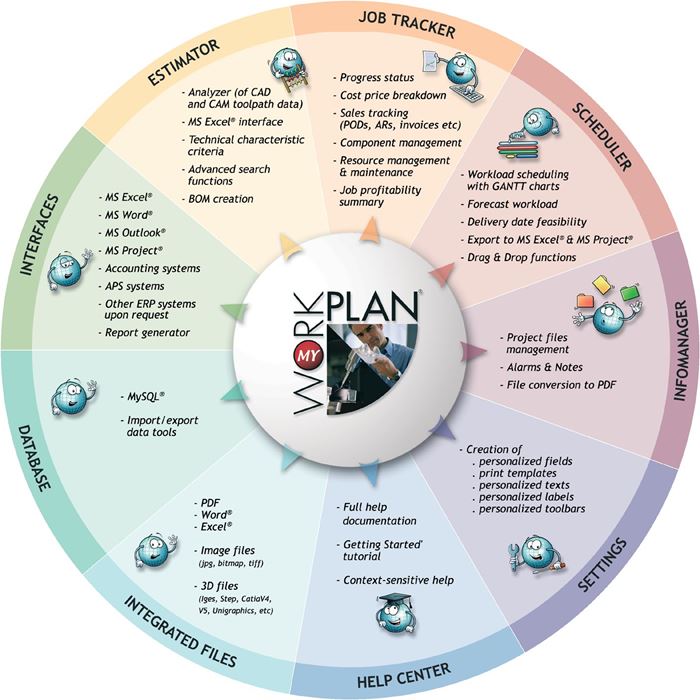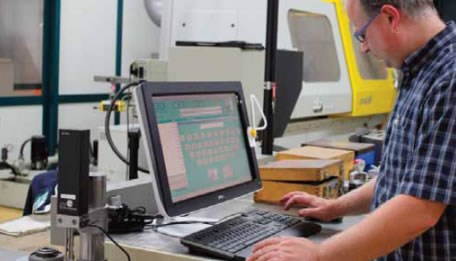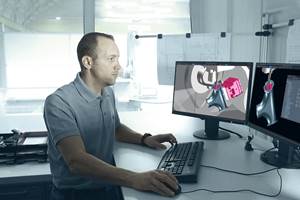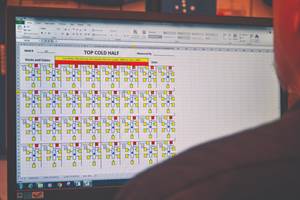Toolmaker Benefits from ERP Software
WorkPLAN Enterprise ERP software integrates with SAP® for greater transparency at German toolmaker HARTING Applied Technologies. The company has 15 WorkPLAN Enterprise workstations in a Citrix terminal server environment enabling managers, controllers, technicians and the sales personnel to have access to relevant data on the central WorkPLAN Enterprise system.
Sescoi’s WorkPLAN Enterprise customer manufacturing ERP has increased transparency within the organization of German toolmaker HARTING Applied Technologies. The company specializes in producing injection and die casting molds, progressive dies, and assembly systems for products such as mechatronic actuators, micro optics, and sensor casings for the electronics, automotive, medical, and engine building industries.
Managing Director Volker Franke explains, “We have the technology to manufacture extremely small parts, for example, we build die casting molds to produce parts with 0.1mm wall thicknesses, while for electronic applications we can produce tooling for contact springs made from 30 µm thick film.”
All of HARTING’s products involve make to order (MTO) manufacturing and, for many years, the company has understood the importance of enterprise resource planning and production planning and control. It is part of the HARTING Group of companies, which uses SAP® to manage its business, but HARTING Applied Technologies used an in-house developed ERP system to manage its production. However, this system was unable to keep up with the evolving requirements of the company, leading it to look for a replacement.
The natural choice was SAP® but on closer evaluation, it was found to be unsuitable. Volker Franke says, “SAP® could not offer us the flexibility we needed for our application. In particular, it required us to enter very detailed production information at an early stage. Because of the way in which we work, this information is not available at the start of a project as we only have an outline of the production method.”
When the company evaluated WorkPLAN Enterprise it realized that the software had been designed with its application in mind. Volker Franke elaborates, “Although it is possible to enter standard times and many details at the start of a project, we do not have to. For our make to order method of production we can start with a preliminary plan with placeholders, which we can edit as we get more information. This allows us to easily determine the level of detail in each project for ourselves. With the other systems we evaluated we had to be far more precise at this stage.”
Volker Franke also praises the easy-to-create tree structure and the interoperable views in WorkPLAN Enterprise. “The user can toggle between screens, going from the customer sheet to the quotations and sales orders as required. Forms, views and filters can be generated easily, enabling us to tailor the system exactly to our needs. Users can do all this themselves, without the need for an IT specialist.”
The decision to install WorkPLAN Enterprise was taken at the end of 2009, with training taking place at Sescoi in December. By mid-January the test installation had been commissioned; by March 2010 all the sales order information had been transferred to the system; and in April the system went live for the first time. Volker Franke says, “We had actually planned to take more time to test the system thoroughly, but unforeseen circumstances forced us to go live immediately without running our existing system in parallel. Everything worked perfectly and the end of the month account for April was transferred to SAP® without any problems.”
WorkPLAN Enterprise has a SAP® interface, and Sescoi is SAP® certified, so the integration between the systems was straightforward at HARTING. The company has 15 WorkPLAN Enterprise workstations in a Citrix terminal server environment enabling managers, controllers, technicians and the sales personnel to have access to relevant data on the central WorkPLAN Enterprise system. The software manages quotation creation, sales order management, invoicing, stock management, purchasing and goods received documentation. SAP® manages the material cost centers, credit control, and time and attendance, so the smooth link that exists between the two systems is essential for the HARTING Group.
As more WorkPLAN Enterprise functionality is being implemented at HARTING, more efficiency is obtained, as part of a continuous process. Clock in/out messages are automatically transferred to and displayed in the SAP® system software, and a new calendar for absences will soon replace the previous Microsoft Excel list.
Volker Franke says, “We have replaced some unreliable external systems for calculating cost with the tools in WorkPLAN Enterprise. Manufacturing costs can now be established in a clear and transparent manner. We are also using the capacity planning functions within the software. It gives us the ability to plan the load of our production resources, leaving the details to our technicians. With Sescoi and WorkPLAN Enterprise, we have found a solution with the flexibility we wanted to reflect our processes.”
Related Content
How to Automate Process and Design
Moldmakers can improve their operations and stop wasting time by taking these six steps for process and design automation.
Read MoreWhat Is Scientific Maintenance? Part 1
Part one of this three-part series explains how to create a scientific maintenance plan based on a toolroom’s current data collection and usage.
Read MoreWhat is Scientific Maintenance? Part 2
Part two of this three-part series explains specific data that toolrooms must collect, analyze and use to truly advance to a scientific maintenance culture where you can measure real data and drive decisions.
Read MoreHow to Select a Mold Temperature Controller
White paper shares how cooling channel analysis, which collects maximum pressure drop, total flow rate and heat dissipation, eases the performance evaluation of mold temperature controllers.
Read MoreRead Next
Are You a Moldmaker Considering 3D Printing? Consider the 3D Printing Workshop at NPE2024
Presentations will cover 3D printing for mold tooling, material innovation, product development, bridge production and full-scale, high-volume additive manufacturing.
Read MoreHow to Use Continuing Education to Remain Competitive in Moldmaking
Continued training helps moldmakers make tooling decisions and properly use the latest cutting tool to efficiently machine high-quality molds.
Read MoreHow to Use Strategic Planning Tools, Data to Manage the Human Side of Business
Q&A with Marion Wells, MMT EAB member and founder of Human Asset Management.
Read More



















